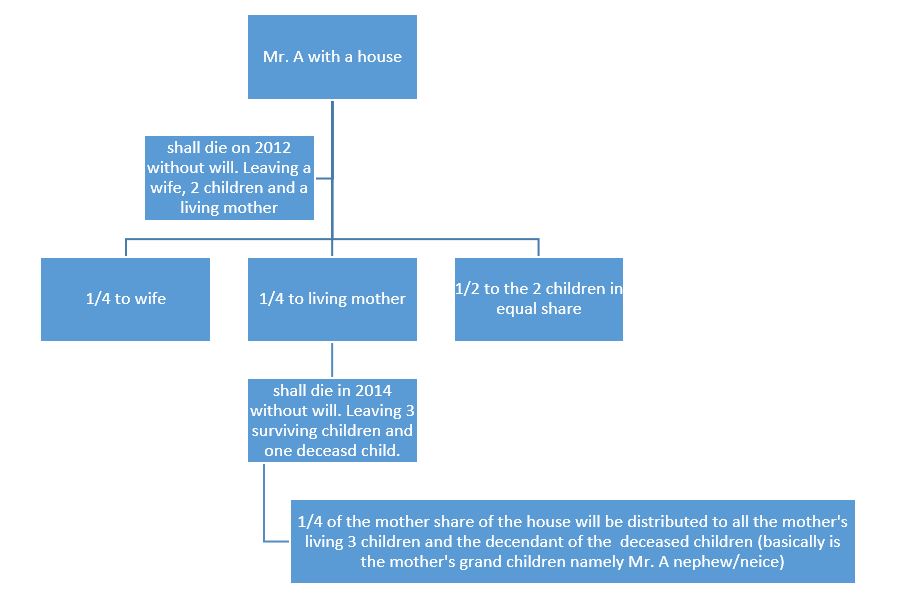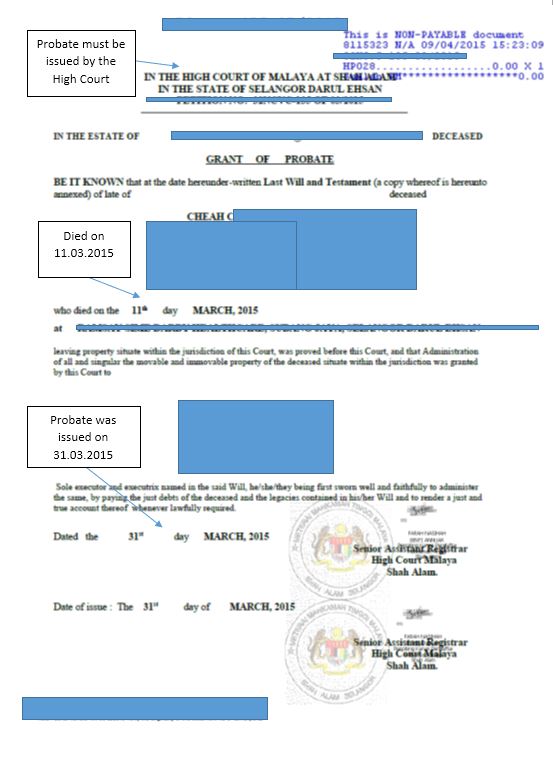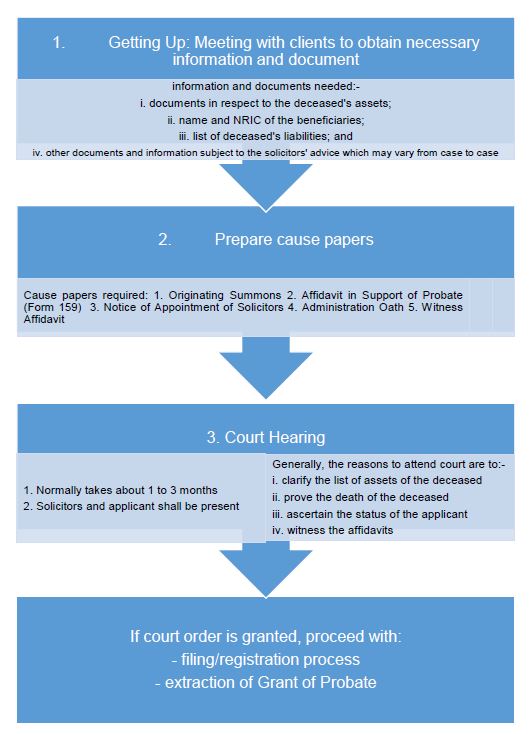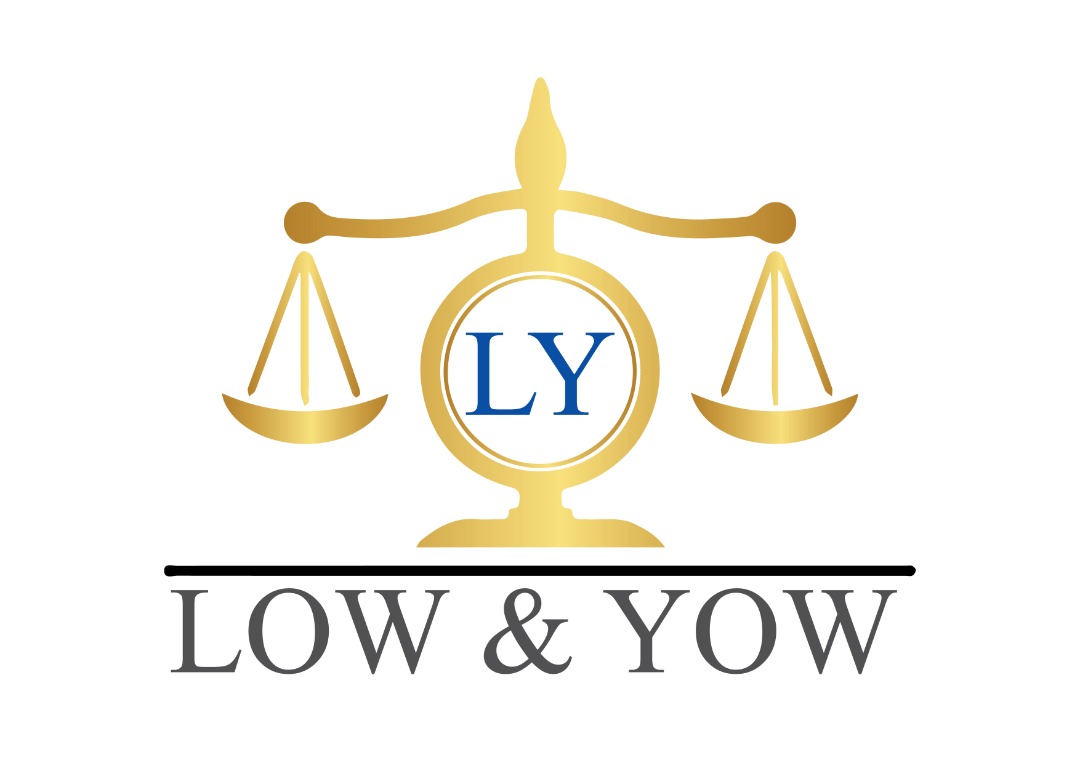Wills & Probate
What is Will?
What is Probate?
Benefits of a Will
Many have heard of Wills but lack of full understanding of its benefits. It is a prudent decision to have a Will in many instances especially if mishap happened in surprise. Having a Will is often not an expensive affair and offer speedy distribution of property and in accordance to your intention. The stamp duty to transfer an immovable property is RM10.00 or less if the grant of probate is obtained. Many have said that it may take atleast 6 months to more than a year to distribute a person property upon his death. With a Will it may just take as short as 2 weeks (more often within 2 to 3 months) to distribute a deceased person’s assets.
Below is the example of a grand of probate.
(Will in itself is insufficient to transfer any property to the beneficiary. Application has to be made to the High Court for the grand of probate to cloth the executor to transfer the deceased property. The Court need the evidence of, inter alia, (i) proof of death; and (ii) to ascertain whether the Will is in order before granting the Grant of Probate:-

In my subsequent articles (below) under the header Distribution of estate, I will further elaboration the process of obtaining the grand of probate.
Problems without a Will

For non-muslim, without a Will a person’s property will be distributed in accordance to Section 6 of the Distribution Act, 1958 and the summary of which are as follows[1]:-
| Spouse/Wife | Issue (means ”(1) the deceased children; and
(2) descendants of the deceased children” |
Parent | Entitlement | |
| (a) | Yes | No | No | Spouse entitled to 100% |
| (b) | Yes | No | Yes | 50% to Spouse
50% to Parent |
| (c) | No | Yes | No. | 100% issue |
| (d) | No | No | Yes | 100% to Parent |
| (e) | Yes | Yes | No | 1/3 to Wife
2/3 to issue |
| (f) | No | Yes | Yes | 1/3 to Parent
2/3 to issue |
| (g) | Yes | Yes | Yes | ¼ Parent
¼ Spouse ½ issue |
[1] Despite Section 6 of the Distribution Act, 1958 set out the manner of distribution of a deceased’s estate, it does not prohibit the beneficiary from renouncing his/her rights over estate and surrender to other beneficiary.
Without a Will distribution may create unpleasant disputes between the family members. Taking for an example, in year 2012, Mr. A passed away leaving a house and the following family members:-
- Wife,
- 2 children, and
- a living mother.
The distribution of his estate will be ¼ to the wife, ¼ to the mother and ½ to be shared equally between his children.
If his mother shall die after him without a will (example year 2014) the mother shares of the house will be equally distributed to the mother’s issue (example in table 2 below). In this example shown below, we can see the ownership of Mr. A’s house are:-
- ¼ to the Wife
- ½ to be shared equally between his children
- ¼ to be shared between Mr. A’s brothers and sisters (as the Mother’s share in the house shall be distributed to the Mother’s Children following Section 6 of the Distribution Act, 1958)

If Mr. A’s wife and children decide to sell the house (which the wife and Mr. A’s children jointly own 75% share of the house) theoretically they can sell their 75% share but it maybe difficult to get a purchaser which don’t mind of not having 100% ownership of the house. Also, in order for the purchaser to get a mortgage, the bank needs 100% shares of the house to be charged to the bank in which the consent of all the registered owners of the house are required (which will include Mr. A’s siblings, nephew and niece).

To create a valid Will
In general, a Will must satisfy the followings conditions:-
- The testator must be above age of 18 years and with sound mind;
- There must be 2 witnesses above age of 18 years. The witness must not be the beneficiary or the spouse of the beneficiary. The testator must sign in the presence of the 2 witnesses which the witnesses must subscribe the will in the presence of the testator;
- There must be an executor and if there is minor or life interest involve atleast 2 executors are required. Executor is the person responsible to executing the terms of the will and to administer the estate accordingly;
- the Will be revoked upon marriage unless is made in contemplation of marriage; and
- The wording used in the Will must be certain and enforceable.
A Will has no effect until the death of the testator. It can be amended from time to time. It will be prudent to have a revocation clause if you wish to revoke your previous Will.
Failure to meet the requirements under the law may cause your Will to be invalid. If your Will is invalid the distribution of your assets will follow Section 6 of the Distribution Act, 1958.

Administration of Estate (Grant of Probate)
If a person die leaving a Will, in order to distribute the deceased person assets, by producing the Will itself is not enough. A grant of probate must be obtained from the High Court. This is a sample of the Grand of Probate:-

The documents that the Court require are including but not limited to:-
- Proof of death or death certificate;
- Original will;
- List of assets and list of beneficiary; and
- Witnesses’ affidavit stating that they have witnessed the deceased Will.
This articles will further elaborate on:-
- Importance of the original Will;
- What happen if the Witness has died or cannot be located?; and
- How to expedite the Grand of Probate?

It is very important to have the original Will. If the original Will is missing, destroyed or cannot be found, leaving only copy of the Will the application of the grant of probate maybe rejected unless, inter alia, all the person prejudiced by the existence of the Will consented to the contain of the Will. I would say the “person prejudiced” is the immediate family members of the deceased which entitled to the deceased estate if the Will is not in existence.
Order 71 rule 46 Rules of Court 2012 provides that:
46 Applications in respect of nuncupative wills and of copies of wills (O 71 r 46)
(1) An application for an order admitting to proof a nuncupative will, or a will contained in a copy, a completed draft, a reconstruction or other evidence or its contents where the original will is not available, may be made to the Court by notice of application:
Provided that where a will is not available owing to it being retained in the custody of a foreign court or official, a duly authenticated copy of the will may be admitted to proof by virtue of section 27 of the Act without any such order as aforesaid.
(2) The application shall be supported by Affidavit setting out the ground of the application and by such evidence on affidavit as the application can adduce as to-
- The due execution of the will;
- Its existence after the death of the testator; and
- The accuracy of the copy of other evidence of the contents of the will,
Together with any consent in writing to the application given by any persons not under disability who would be prejudiced by the grant.
What happen if the Witness cannot be found or has died?
There is a possibility that the Court will not allow the Grand of Probate unless you can satisfy Order 71 rule 46 Rules of Court 2012 above.
It is my opinion, during the execution of the Will get the witness to sign whatever necessary for the witness Affidavit. Even if the witness cannot be found or shall die, the documents remain usable.
How to expedite the issuance of the Grand of Probate?
Complement shall be given to our judiciary. In normal circumstances, the hearing date for an application of the grant of probate is around 1 months to 3 months from the date of application. In average it will just take 1 to 2 months to obtain the Grand of Probate.
However, in urgent cases, the Court allow “Certificate of Urgency” to be filed. Good reason shall be given. It may just take 1 to 3 weeks for the Grand of Probate to be issued. Based on the sample of the grand of probate above, it just take 3 weeks for the Grand of Probate to be issued.
Frequently asked questions on Grant of Probate
- How much does it cost to obtain a Grant of Probate?
The costs to obtain a non-contentious Grant of Probate is generally inexpensive. We apologise that we are unable to publish out the rate due to the Bar Council Ruling, unless you contact us by phone (03-3345 6611), emails (general@lychambers.com), messenger or whatsapp.
- How long will it take to obtain a Grant of Probate?
Normally, it takes around 1 to 3 months to obtain a Grant of Probate, subject to the hearing date fixed by the Court. For urgent cases, a Grant of Probate could be obtained around 1 to 2 weeks.
- What are the procedures to obtain a Grant of Probate?

- What will happen after the Grant of Probate has been obtained? The solicitors will furnish to the appointed executor sufficient copies of the Grant of Probate issued by the Court. You may use the Grant of Probate to withdraw the money in the deceased’s bank account, sell and transfer shares held under the deceased’s estate, dispose the deceased assets and to pay the deceased liabilities and etc.For immovable, landed or non-landed properties, you may seek your solicitors’ guidance on the transfer of property. The reasons being each state in Malaysia has its own law and different property has different requirements in nature. As such, it will be prudent to seek your solicitors’ advice.If you have any queries, please do not hesitate to contact us by email, calls or whatsapp.
